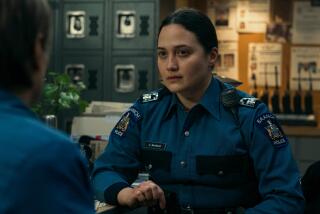Rebecca West: Life As Libretto : REBECCA WEST : This Is What Matters <i> by Victoria Glendinning (Alfred A. Knopf: $19.95; 286 pp., illustrated) </i>
- Share via
The public Rebecca West was so formidable a figure that re-imagining her as a lonely child, a troubled adolescent, a passionate lover, an ambivalent mother or a devoted wife is like learning an entirely new language. Glendinning, who specialized in biographies of extraordinary women, the more imposing the better (see Endpapers, Page 15), has precisely the right credentials. Experience has taught her how to humanize her subjects without diminishing them, no easy job when you’re dealing with the self-created legends of the century. As the author says in her introduction, “Rebecca West lived her life operatically, and tinkered endlessly with the story line, the score and the libretto. The plot remains unresolved.”
Concerned that a single biographer, no matter how dedicated, might not do justice to her extraordinary life, West took the precaution of authorizing two writers to tackle the assignment. Glendinning was to do the shorter book, concentrating upon youth and middle age; Stanley Olson was awarded the definitive treatment. Anthony West, Rebecca’s son by H. G. Wells, preempted them both by writing his own autobiographical novel, “Heritage,” a corrosively bitter account of his tortured relationship with his illustrious parents. Without actually disputing Anthony West’s personal vision, Glendinning manages to rehabilitate Rebecca West’s image in a work that succeeds both as a model of cool objectivity and as a capsule history of modern woman from 1892 to 1983, with West always in the vanguard of change.
Rebecca West was invented shortly after she had begun to write under her own name of Cicely Isabel Fairfield for an English feminist weekly, “The Freewoman.” She was 19 years old, and her literary debut was arresting. Reviewing a book on the status of women in India, she minced no words. “There are two kinds of imperialists--imperialists and bloody imperialists.” Apparently concerned that her unladylike language might embarrass her mother, she borrowed from Ibsen’s play “Rosmersholm” the name of a woman who forces her married lover into a suicide pact. As Glendinning remarks, “Much could be made of her choice of name.” Later, after having been the mistress of a few married men herself, notably H. G. Wells and Lord Beaverbrook, West denied any desire to identify with Ibsen’s heroine. Though she admitted that Ibsen had taught her that “ideas make the world go round,” she commented uncharitably that “I began to realize that Ibsen cried out for ideas for the same reason men call out for water, because he had not got any.”
West was an instant sensation in literary London. Looking like a schoolgirl in pastel frocks and garden party hats, she delivered outrageous statements in a mellifluous voice trained for the stage. She had, in fact, desperately wanted to be an actress, as she makes clear in her posthumously published novel “Sunflower.” Writing was second choice, embarked upon only after she failed to qualify for a second year at the Royal Academy.
Virtually West’s last piece for “The Freewoman” was a review of H. G. Wells’ new novel, “Marriage.” Wells, in his mid-40s, married and already an eminence of English letters, invited her to lunch. The rest is history. Within months, they were lovers, a pair of awesome intellects calling each other Panther and Jaguar as they cuddled their way across the Continent, their relationship generously tolerated by Wells’ long-suffering wife Jane.
Wells was succeeded by Lord Beaverbrook, whose tenure was shorter and stormier. Finally weary of the strains of unmarried motherhood and longing for the stability that neither Wells nor Beaverbrook could offer her, she married Henry Andrews, a sweet, sensible man for whom she felt more affection than passion. Despite (or perhaps because of) her flamboyant life, she firmly believed in marriage; “the job I was born to do, and I did it.”
West continued to produce novels and essays on a variety of topics, doing her best work for The Observer and The New Yorker. As her style matured, she became increasingly outspoken and judgmental. The quintessential West-works, written in the ‘30s and ‘40s, are “Black Lamb and Gray Falcon,” inspired by her visit to Yugoslavia, and “The Meaning of Treason,” her hotly debated and widely read discussion of treachery in all its forms, begun as a report on the trial of William Joyce, the Nazi propagandist known as Lord Haw-Haw. Appearing first in The New Yorker in 1945, “The Meaning of Treason” has since become a classic, the book that not only earned her the Order of the British Empire, but recognition by Time magazine as “indisputably the world’s No. 1 woman writer” and an accolade in The New York Times Book Review saying that “Rebecca West comes closer than any other living writer to the achievement of a counterpoint in prose as rich as plural melody in music. She writes, as life is lived, on many levels.”
Paradoxical, mercurial and committed to the end, West challenges even Glendinning. That, of course, is exactly what she wanted from the start of her astounding life and career. While young and in love with Wells, she wrote: “We are each an amalgam of the will to live and the will to die.” At 90, she was still proving herself right.
More to Read
Sign up for our Book Club newsletter
Get the latest news, events and more from the Los Angeles Times Book Club, and help us get L.A. reading and talking.
You may occasionally receive promotional content from the Los Angeles Times.










